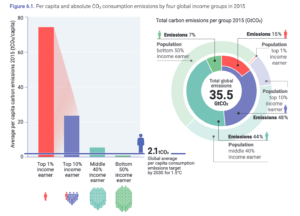Managers welcome EU Climate Pact
CEC European Managers welcomes the launch of the European Climate Pact by pledging to contribute mainstreaming Sustainable Leadership in the world of management. CEC’s Sustainable Leadership in Europe study has shown that managers in particular face a considerable gap between ambition and reality to create a fairer and greener economy. As an active member of civil society representing managers, CEC is committed to advancing concrete managerial action for climate neutrality.
“We are pleased to join the European Climate Pact to advocate for climate action within European management. As European social partner and voice of managers, we assume our responsibility in ensuring there is broad consensus and sufficient capacity among managers to quickly transition to net zero” says Ludger Ramme, President of CEC European Managers

The top 1% income earner produce 15% of global emissions
On 16. December 2020, the European Commission has launched the European Climate Pact to empower citizens in shaping a greener tomorrow. It is part of the larger EU Green Deal framework. According to the Commission, the Pact “provides a space for people across all walks of life to connect and collectively develop and implement climate solutions. It will support local initiatives and encourage climate action pledges by individuals or collectives, helping to mobilise support and participation.“
Through its project on Sustainable Leadership, as well as its contribution to the ManagersForFuture movement, CEC European Managers is actively shaping the debate around the future of the managerial profession. While today, many managers lack in knowledge, skills and the right mind-set to leverage effective change for our climate, CEC is working on providing all relevant resources and leadership know-how to change that. That’s why CEC will follow-up and commit on bringing climate action to EU management. As top income earners, managers in the EU also count among the top polluters, according to the recent Emissions Gap Report by UNEP.
While global warming is of serious concern, it is important to acknowledge the interrelatedness with other systemic challenges, including biodiversity, financial instability or the notion of a just transition that works for citizens and workers. This historic moment requires us managers to move beyond silo-thinking and apply new ways of being and doing. The climate-neutral future economy will be built by better working together through new types of competences, partnerships and business ecosystems.




